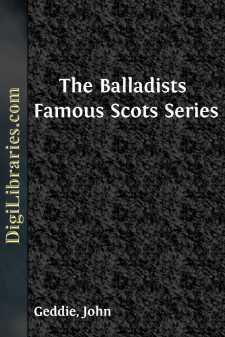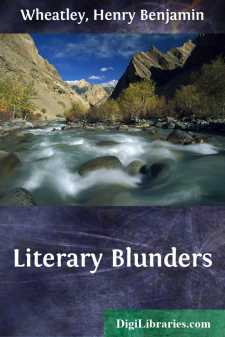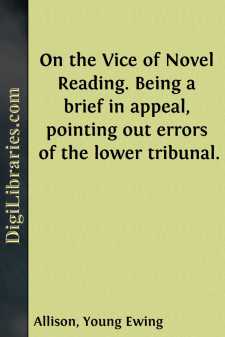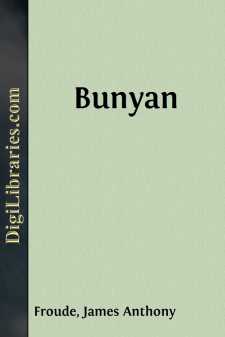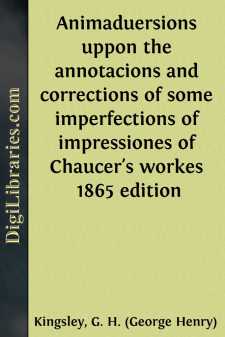Literary Criticism
- American 18
- Ancient and Classical 3
- Asian 1
- Australian & Oceanian 1
- Books & Reading 8
- Caribbean & Latin American 2
- Drama 2
- English, Irish, Scottish, Welsh 49
- European 7
- General 37
- Horror 1
- Humor 2
- Jewish 2
- Medieval 2
- Middle Eastern 3
- Poetry 7
- Renaissance 6
- Russian & Former Soviet Union 1
- Shakespeare 27
Literary Criticism Books
Sort by:
by:
John Geddie
CHAPTER I BALLAD CHARACTERISTICS'Layés that in harpingBen y-found of ferli thing;Sum beth of wer, and sum of wo,Sum of joye and mirthe also;And sum of treacherie and gile;Of old aventours that fell while;And sum of bourdes and ribaudy;And many ther beth of faëry,—Of all things that men seth;Maist o' love forsoth they beth.'The Lay of the Ash. Who would set forth to explore the realm...
more...
When I first met Belloc he remarked to the friend who introduced us that he was in low spirits. His low spirits were and are much more uproarious and enlivening than anybody else's high spirits. He talked into the night; and left behind in it a glowing track of good things. When I have said that I mean things that are good, and certainly not merely bons mots, I have said all that can be said in...
more...
1881. Question 1.—Sound is said to travel about four times as fast in water as in air. How has this been proved? State your reasons for thinking whether sound travels faster or slower in oil than in water. <p 184> Answer(a).—Mr. Colladon, a gentleman who happened to have a boat, wrote to a friend called Mr. Sturm to borrow another boat and row out on the other side of the lake, first...
more...
CHAPTER I My Boyhood Reading Early Recollections To get the best out of books, I am convinced that you must begin to love these perennial friends very early in life. It is the only way to know all their "curves," all those little shadows of expression and small lights. There is a glamour which you never see if you begin to read with a serious intention late in life, when questions of technique...
more...
Dust “I see the ships,” said The Eavesdropper, as he stole round the world to me, “on a dozen sides of the world. I hear them fighting with the sea.” “And what do you see on the ships?” I said. “Figures of men and women—thousands of figures of men and women.” “And what are they doing?” “They are walking fiercely,” he said,—“some of them,—walking fiercely up and down the...
more...
by:
Ian Maclaren
BOOKS AND BOOKMEN They cannot be separated any more than sheep and a shepherd, but I am minded to speak of the bookman rather than of his books, and so it will be best at the outset to define the tribe. It does not follow that one is a bookman because he has many books, for he may be a book huckster or his books may be those without which a gentleman’s library is not complete. And in the present...
more...
ON THE VICE OF NOVEL READING. Ever since the Novel reached the stage of development where it was demonstrated to be the most ingenious vehicle yet designed for conveying the protean thought and fancy of man, there has stood in the judgment book of Public Opinion the decree that novel-reading was a vice. Of course, that judgment did not apply exclusively to the reading of novels. It was a sort of...
more...
CHAPTER I BROWNING AND TENNYSON Parnassus, Apollo's mount, has two peaks, and on these, for sixty years, from 1830 to 1890, two poets sat, till their right to these lofty peaks became unchallenged. Beneath them, during these years, on the lower knolls of the mount of song, many new poets sang; with diverse instruments, on various subjects, and in manifold ways. They had their listeners; the Muses...
more...
EARLY LIFE. 'I was of a low and inconsiderable generation, my father's house being of that rank that is meanest and most despised of all families in the land.' 'I never went to school, to Aristotle or Plato, but was brought up in my father's house in a very mean condition, among a company of poor countrymen.' 'Nevertheless, I bless God that by this door He brought me...
more...
PREFACE. Although only the grandson of the first of his name, the author of the following interesting specimen of 16th-century criticism came of a family of great antiquity, of so great an antiquity, indeed, as to preclude our tracing it back to its origin. This family was originally known as the “De Botfelds,” but in the 15th century one branch adopted the more humble name of “Thynne,” or...
more...


